How locals foiled huge drugs plot in underground bunker
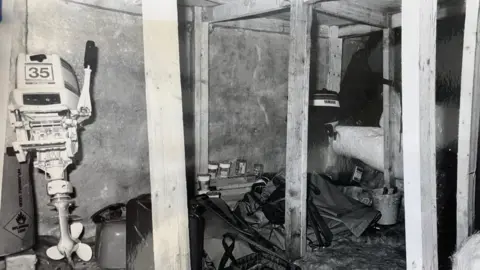 Don Evans
Don EvansAn underground bunker built on a west Wales beach in 1983 was a "pilot project" by drug dealers which, if successful, would have made Pembrokeshire the epicentre for cannabis distribution in the UK.
Ringleaders Robin Boswell and Danish actor Soeren Berg-Arnbak were planning on importing three tonnes of cannabis with a street value of £7m.
Former Ch Supt of Dyfed-Powys Police, John Daniels, said the gang devised the idea of the beach bunker as an underground storage unit for multiple importations after losing drugs at sea and would run it like "a military operation".
However, it was discovered before it stored any drugs after the gang underestimated the power of local curiosity.
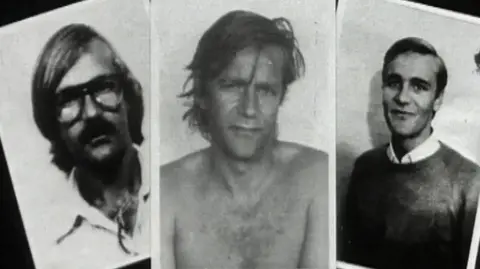
The Dane was also one of Europe's most wanted drug dealers and had been on the run for 11 years.
He regularly changed his identity and was known as "the man with rubber face".
In 1983, the 35-year-old lived a millionaire's lifestyle on a luxury yacht, and owned villas in Italy and Switzerland.
But on the run, he relocated to Pembrokeshire, which would lead to his downfall.
His arrest followed reports from farmers and fishermen of unusual activity at a remote bay which was only accessible by boat.
"The gang were going to run this like an SAS operation," said Mr Daniels.
"The size of the inflatable ribs and motor engines told us that, but they were caught out by SAS-style inquisitiveness by the local people of Newport."
The men were also making themselves known in Newport and neighbouring Dinas Cross, driving expensive cars including a Ferrari, Porsche and convertible Rolls Royce and spending large amounts of money in the local pub.
"It was the end of the 'loveable rogue' era of drug criminals, they were enjoying themselves too much, back in 1983 a pint cost 75p but these men were flashing £50 notes around the local pubs and buying lobsters, while the people of Newport liked them it was also their downfall," Mr Daniels said.
Speaking to the BBC's Strange but True Crime podcast which looks at the crime and the role the community played, Mr Daniels said: "It was the best example I'd seen of the community and the police working in tandem.
"It was like a jigsaw puzzle. The community would give us one piece and we'd find another part of the puzzle and it grew into this tapestry and gave us the complete picture.
"I remember the lead prosecutor during the trial saying 'people might think the people of Newport were being inquisitive but I'd put it down to good old fashioned nosiness'."
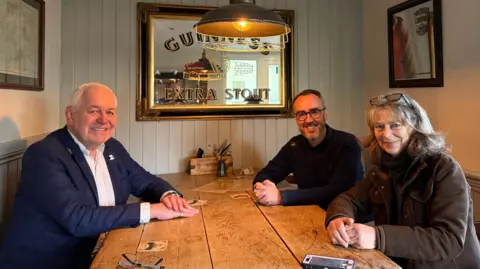
Sue Warner and her parents, who lived on a farm overlooking the coast near Newport, informed police of suspicious activity on the bay.
"The only time it felt sinister was when my parents spoke to a man on the cliff top because they could see him looking down to the bay and Dad asked him 'what's down there'.
"And he just looked at them, my mum said she'd never seen such cold eyes.
"She said they made her feel chilled looking at his steely blue eyes, and that turned out to be Soeren Berg-Arnbak."
Ms Warner's father decided to camp out one night to carry out his own surveillance of the bay.
"Dad didn't see anything but he knew something was up," she said.
"Everyone knows everybody by a few degrees in Newport... people were beginning to talk about the activity and the group of men flashing the cash in the local pub."
Lobster fishermen also spotted activity at the bay, and informed the Newport inshore rescue crew, fearing they might be poachers.
The men on the beach told the boat crew they were training for an expedition to Greenland to film whales and seals.
But when the crew did not believe them, they returned with Dyfed-Powys Police officers.
Police carried out a search of the bay with a farmer, who picked up a stone and threw it, which made a hollow sound when it hit the ground.
When officers cleared the ground of pebbles and rocks and discovered a hatch leading to an underground bunker, Operation Seal Bay was launched.
Ms Warner said: "Drug smuggling was always the speculation from day one because a big bale of cannabis had washed up the year before."
A month after it washed up, Boswell had carried two suitcases into a bank on the Isle of Man and paid in £757,000, all in cash.
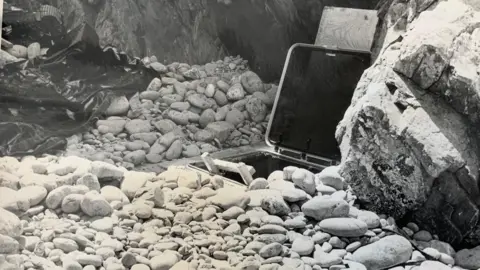 Don Evans
Don EvansPolice caught Boswell after a stranger matching his description was spotted by two young boys and their mother.
Don Evans, Det Ch Insp with Dyfed-Powys Police, who jointly led the incident room for the operation with Det Supt Derek Davies, said: "Robin Boswell had used 17 different false names and addresses and fortunately we were able to catch him quickly before he disappeared because he saw the police activity and realised things had gone wrong and was trying to get out of the area.
"We had the total support of the community, it was amazing how people had made mental notes of strange things happening and in all we took 500 statements.
"It's one of the best inquires I was involved with and something I'll never forget because it was tremendous recognition for Dyfed-Powys Police, but we would never have succeeded without all the help from the public."
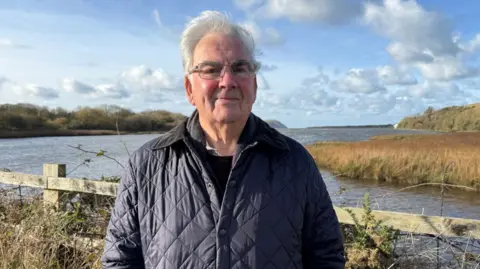
Berg-Arnbak was also arrested the next day after being spotted by officers on patrol near Fishguard.
He ditched his rucksack and fled across fields before jumping over a hedge and barbed wire fence, without realising there was a 70ft (21m) drop into a quarry on the other side.
He only survived by grabbing a protruding tree root to break his fall and was arrested at the bottom of the old quarry, ending his 11 years on the run.
Police seized his rucksack, containing a high-powered radio which was being used as part of the drug smuggling operation.
On a hunch, officers then set up the radio on a cliff top that night, after hours of waiting, they finally heard a message saying "mother, mother, I want to come in to get the dirt off my hands".
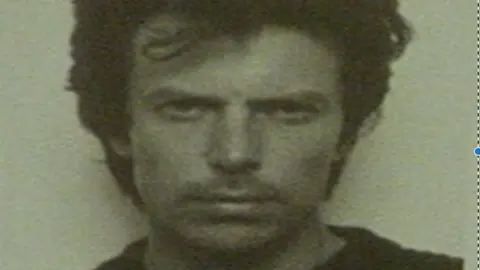
Mr Evans said: "That was obviously a coded message from a vessel saying they had the drugs ready to bring to shore and that was an indication that there was an importation ready to come in.
"There was huge profits to be made and they were motivated by greed but they totally underestimated the inquisitiveness of the local people."
Berg-Arnbak was sentenced to eight years and Boswell to 10 years in prison.
Six other members of the gang were also jailed.
The trial judge commended the police and the people of Newport for bringing the gang to justice.
